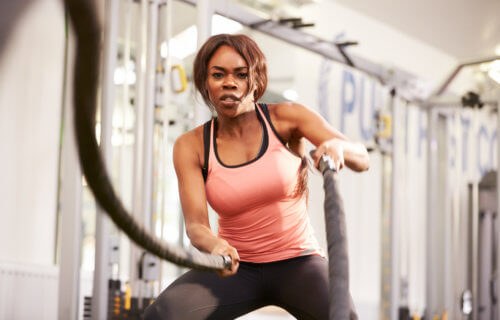
CAMBRIDGE, England — Some people are just naturally better athletes, and, new research reveals the majority of the difference in physical ability is largely due to genes. Even if two people do the same exercises and follow the same training program, researchers say the majority of the difference comes down to how their genes react and build muscle.
Strength, cardiovascular fitness, and anaerobic power can all be put down to a person’s genetic makeup, according to the study by British scientists. The scientists analyzed results from 3,012 adults aged between 18-55 — who had not previously taken part in exercise training — to determine how genes can affect the three important types of exercise. While all participants showed improvements following their training, they all showed changes at varying degrees.
By combining data from 24 separate studies, the study concludes that genetic differences are responsible for 72% of the variation in outcomes for people using an identical strength training regimen. Genetic variants are linked to 44% of the differences seen following cardiovascular fitness exercises.
Additionally, genetic variants caused 10% of the differences in outcomes following exercises to improve anaerobic power, which is key for movement and agility. The remaining variations are influenced by other factors such as diet and nutrition, recovery, and injuries.
Each gene possesses alleles, and the allele type can influence how effective that gene is. The researchers believe it is these alleles that cause people’s bodies to respond differently to the same exercises. In total, the study identified 13 genes and associated alleles as being responsible for how well the body reacts to cardiovascular fitness, muscular strength, and anaerobic power exercises. Researchers believe by testing a person’s genes, experts could create and tailor a personal training regimen.
“We know that exercise is good for us, but we all improve at different rates, even when following identical training regimes. This means there are other factors at play. Our study found 13 genes that have a role in exercise outcomes, and we found that specific alleles contained within these genes are more suited to certain aspects of fitness,” explains a postgraduate researcher at Anglia Ruskin University, in a statement.
“For example, with repetition exercises designed to boost muscular strength, genetic differences explained 72% of the variation in outcomes between people following the same training. Because everyone’s genetic make-up is different, our bodies respond slightly differently to the same exercises,” adds Dr. Chung. “Therefore, it should be possible to improve the effectiveness of an exercise regime by identifying someone’s genotype and then tailoring a specific training program just for them. This could particularly benefit those who need to see improvements in a short period of time, such as hospital patients, or elite sportspeople, where marginal improvements could mean the difference between success and failure.”
The study is published in the journal PLOS ONE.
South West News Service writer Joe Morgan contributed to this report.
